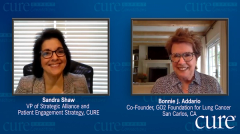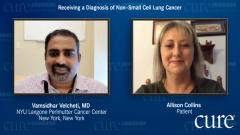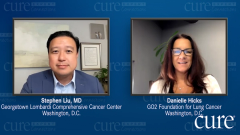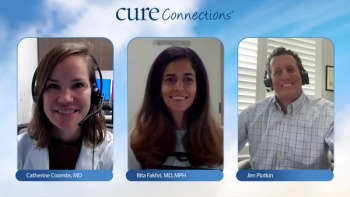
The Importance of Shared Decision-Making in Receiving Molecular Testing for NSCLC
Stephen Liu, MD, and Danielle Hicks clarify the importance of involving patients and caregivers in discussions about non-small cell lung cancer molecular testing.
Episodes in this series

Stephen Liu, MD: So, I want to talk a little bit [about] the importance of shared decision-making and how we look at oncology with medicine now compared to decades ago. When we think of lung cancer, lung cancer really is a multidisciplinary disease; at any stage, we’re going to require multiple people, multiple healthcare providers, multiple physicians to be involved in a patient’s care to make the diagnosis [and] do the molecular testing. And when we think of a medical oncologist as someone who’s sort of driving that car, who’s helping to make those decisions, it really is a partnership between the medical oncologists, radiation oncologists, the surgeon, and also deep pathologists, the molecular pathologist, people that have sort of helped process the tissue in certain ways. There are lots of different members of this team, and they’re all very important once we think of biomarker testing in advanced lung cancer.
Danielle, an important person in that team that we often overlook is the patient. And so, does the patient play a role in deciding on molecular testing?
Danielle Hicks: So, we believe wholeheartedly in shared decision-making involving the patient. We also believe wholeheartedly in [a] multidisciplinary team approach of healthcare providers looking at the patient and ultimately treating the patient.
But I think the shared decision-making is such an important piece of it, giving patients a voice. And, again, for a multitude of reasons, going back to control... When people feel like they have lost all control, allowing them to be a part of [the decision-making process] with their healthcare providers, talking to them about goals of care and what that might look like for the patient, [is crucial]. It’s interesting, because I’ve had patients who haven’t had this conversation with their healthcare provider. I strongly encourage it. Sometimes patients are afraid; they don’t want to insult their physician by coming at them with questions because doctors are supposed to know everything, right? Which I think is insanely unrealistic, but that’s another conversation.
I think that piece, that empowerment piece, is so very important, and I cannot express enough how much we’ve talked to folks about having these conversations with their doctors. Quite often, we’ll have patients saying, “Well, why should I be the one to have to bring up x, y, or z to my physician, right? Shouldn’t they just know?” Or, “Why did I have to come to you to find out this information that my healthcare provider should have given me?”
And although I understand that that can be frustrating and disheartening for a patient, I also always choose to let them know, “You just did a service to the next patient that comes behind you because maybe something your doctor knows, they do now, and that’s because of you. And so, not only are you fighting this disease, but you’re having impact for the next person that will walk in the door.”
Stephen Liu, MD: I think that’s a great way to put it, and we’ve got to open... You know, it’s got to be an open lane of communication. And paternalistic medicine really is not how we practice medicine anymore. There are lots of sources of information. There’s directed consumer marketing, as you mentioned. We get our information from lots of different sources, and an oncologist may be extremely busy seeing lots of different cancers. If a drug was approved yesterday, then a call just may not know yet. You know, we don’t get sort of these magic alerts sort of implanted in our brain. It may take a little while for that information to disseminate.
So, if a patient says, “What is this drug that I read on this clipping that was approved yesterday?”, then I think they can sort of learn about it together. And the oncologist is still qualified to go then and investigate and understand the trial, understand the data, explain the risks, the benefits, educate [the patient] more. But bringing it to the oncologist’s attention, I think, is not a bad thing, and patients need to be comfortable with those types of discussions and really having that communication. Are there things that patients should be asking for with regards to biomarker testing?
Danielle Hicks: So, you know, I always like to make suggestions to patients—suggested questions to ask your physician, not, like, mandatory questions. But I think it’s important for patients to know their cancer and [start] that conversation with their physician about what is the best path towards getting to know and understand [their] cancer. And I think that includes information and education about biomarker testing at diagnosis.
And then, asking other questions about what we just talked about a little bit earlier, about [retesting] at progression. “What does that look like for me, and should I be retested at progression? Is it a tissue biopsy? Is it a liquid or blood-based file?” The more you can educate yourself, the better conversations you can have with your physician on a level that you’re able to understand.
Stephen Liu, MD: I think that’s really important. And sometimes physicians may be completely aware of a testing that they may have other preconceptions [of], that they may be making assumptions [about] that [are] incorrect. For example, if a patient were to ask, “What about repeat molecular testing?”, the oncologist may have thought of that and said, “Well, I don’t know that the patient wants to spend the money on that.” Or, “[The patient] may be worried about the cost.” Whereas the patient says, “No, I am willing to do that.”
I think that communication on both ends can always be improved. So, voicing those concerns, bringing those suggestions, I think, can be very productive, very meaningful. When I think about a doctor-physician relationship today, it really is a partnership with engagement in both sides. I think it’s very important.
Transcript edited for clarity.



